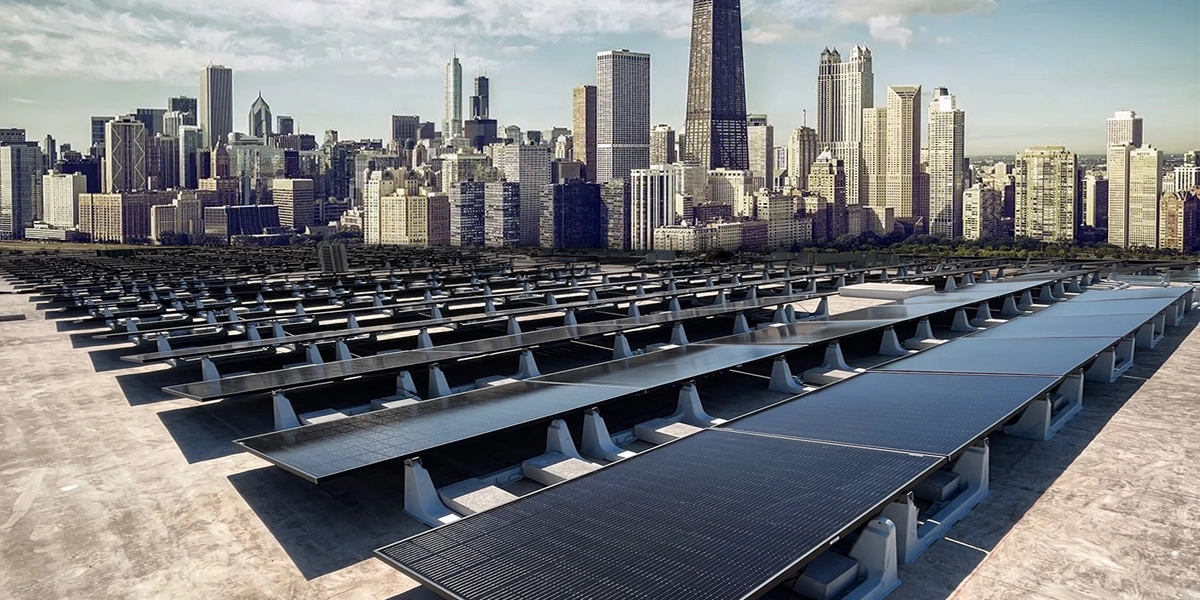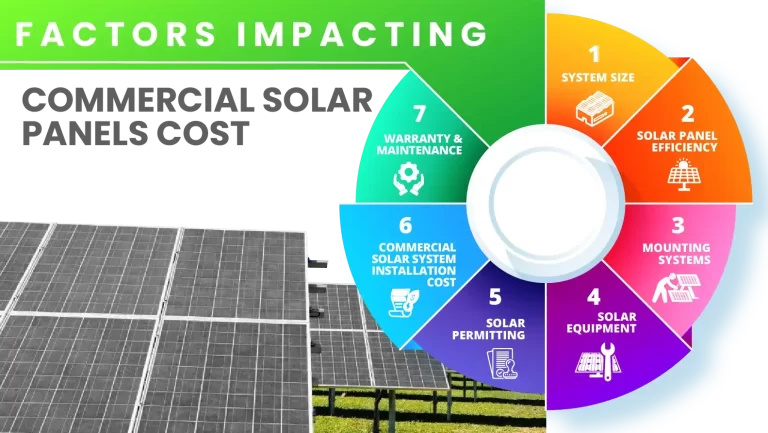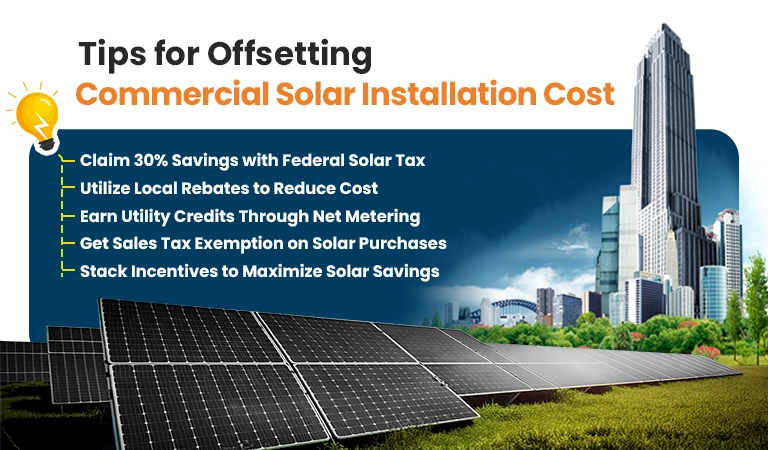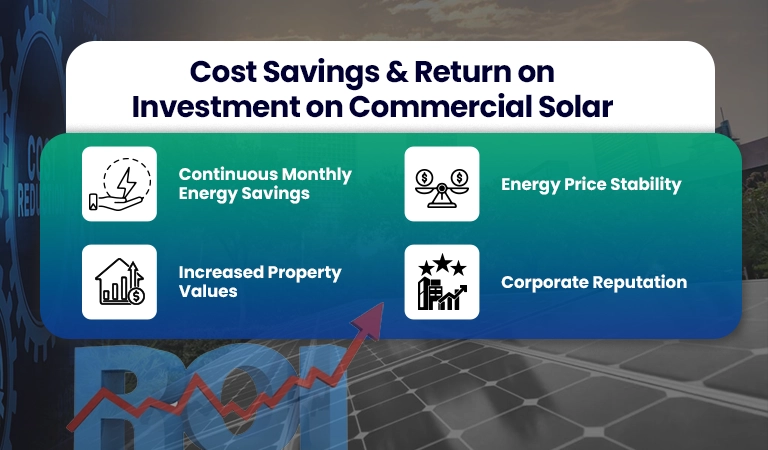- Updated On: July 10, 2025
Commercial Solar Panel Cost Guide:
What to Expect and How to Save?
Prolonged power outages and high energy bills are now an increasing nightmare for the majority of businesses across the U.S., which come with costly interruptions, reduced production, and frustrated consumers. For business owners, every minute of outage means loss and delay, making energy independence a major concern. That is where commercial solar comes in as a solution. According to SEIA, commercial solar can help reduce energy costs by up to 95%. Furthermore, 2.12 GW-DC of commercial PV capacity has been added in 2024. Installing commercial solar systems not only reduces grid dependence but also leads to long-term financial savings and low operational costs. However, the commercial solar panel cost may seem higher initially, but the ROI makes it worth it to invest. Also, if you switch in 2025, you can cut the solar installation cost with a 30% federal tax credit and local incentives. Furthermore, companies can even earn by sending excess power back to the grid.

This comprehensive commercial solar panel cost guide will help you understand the impacting factors and tips for lower expenses. Also, we will analyze the cost and savings analysis to explore whether commercial solar is worth it for your business.
How much do commercial solar systems cost?
Every commercial installation is different. Many variables determine the cost of commercial solar panels. As energy usage is different in a large warehouse and a small boutique shop, system size matters. Furthermore, the costs differ with solar panel types, and efficiencies will also come with different price tags. Beyond that, the energy needs determine the cost; larger businesses typically have more power requirements. Also, if your company is in a hot climate and requires more air conditioning, you will probably require more solar panels.
What are the factors impacting the cost of commercial solar panels?
There’s such a large range when it comes to the cost of commercial solar because there are many factors that can have an impact on your total. Here are major factors impact commercial solar installation prices:

System Size:
The cost is influenced by the size of the solar array. A larger system size needs more solar panels and other solar equipment, which adds to the cost.
Efficiency of Panels:
Another important factor in depicting cost is the brands and solar technology. High-efficiency PV panels are usually expensive. They provide maximum energy yield and, hence, maximum solar savings. Solar experts always recommend that investing in quality solar accessories and panels helps ensure maximum long-term savings.
Mounting Systems:
Costs will vary based on the complexity and nature of racking and mounting systems required for the installation. Different installations, including roof-mounted, ground-mounted, etc., take different amounts of labor, solar engineering, material, and permitting.
Solar Equipment:
Solar inverters are the key components for the DC to AC conversion. The high-efficiency inverters are costly. Other solar equipment, including wiring, meters, backup components, etc., all add to the initial installation cost.
Solar Permitting:
Additional costs may exist for system adjustments, documentation, and inspections for compliance with local codes like NEC solar code 2023, solar interconnection, solar permit requirements, and regulatory requirements.
Commercial Solar System Installation Cost:
All the associated costs of commercial solar system installation, for instance, hiring trained professionals or subcontractors, can determine the final cost.
Warranty & Maintenance:
The warranty period of the solar system and routine maintenance expenses need to be factored in. Equipment and superior-level warranties may cost more.
How can you lower the commercial solar installation cost in 2025?
To encourage businesses to embrace solar, the states and local utilities are offering various solar incentives, rebates, and tax credits. These programs can help you lower your upfront installation expense. Some of the best incentives are:

Investment Tax Credit:
A notable federal incentive for solar is the Investment Tax Credit (ITC). Companies can take a deduction of 30% of the cost of solar installation against their yearly taxes. Solar investments are made more appealing and affordable to companies through this tax advantage. However, it might expire in 2026, so it is best to book your installation now to avoid incurring 30% expenses.
Local Incentives:
To convince companies to switch over to solar energy, different local governments provide incentives. Solar installations can be lowered in upfront costs by these local incentives.
Net metering:
Net metering allows companies to send their excess generated solar power back into the grid in exchange for credits on their electricity bill each month. Statewide net metering is provided by local electric companies. This guarantees that companies gain benefits from their excess energy production, enhancing the economic viability of solar installations even further.
Sales Tax Incentive:
During the process of installing a solar panel system, sales tax incentive provides a waiver from state sales tax, or the use and sales tax. This allows business owners to pay additional taxes due to the added value of their solar panels.
SRECs:
Some states have SREC markets where you can sell your energy credits and earn. You get 1 solar renewable energy credit by generating 1,000 kWh of power. This is the best opportunity for a shorter solar payback period.
What is the cost savings & return on investment on commercial solar?
Commercial solar panel costs include both the equipment and the installation costs, which might be high during the early stages. Nevertheless, different financial incentives can reduce such costs. However, various financial incentives can significantly reduce these costs. After the solar payback period, your business will generate free energy.

Continuous Monthly Energy Savings:
Solar panels provide free, unlimited energy for decades, reducing monthly energy bills.
Energy Price Stability:
Solar energy protects your business from rising energy costs, ensuring long-term financial stability and lower operational costs.
Increased Property Values:
Solar-equipped properties typically have higher values and sell faster than those without PV systems.
Corporate Reputation:
Committing to environmental responsibility enhances customer loyalty and differentiates your business from competitors.
Investing in commercial solar is not just about cutting costs; it’s about securing your business’s future. Solar SME is dedicated to helping you navigate the transition to renewable energy seamlessly. Our expertise ensures that your investment is optimized for maximum savings and efficiency, empowering your business to operate sustainably. So, take a step toward a greener, more resilient future.
Ready to reduce your operational costs? Start your solar journey with Solar SME by getting a FREE Quote with our smart solar calculator.
Related Articles:
30% federal tax credit is expiring in 2025. But if you missed out on it, you can still access solar power with Solar Lease/PPA financing. This option is an opportunity to get all the advantages of solar power while making no large initial investments. Explore More!
Installing a solar energy system is a costly investment, but the good news is that there are several solar financing options to fit your budget and financial goals. Lets explore each financing option and its pros and cons to help you in the decision-making process.
It may require an upfront cost to install solar panels, however, there are various solar financing options. Explore the best option . between solar lease vs buy and make an informed choice.



